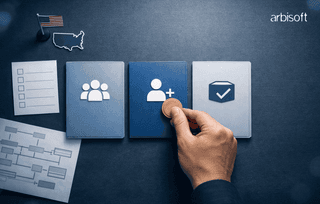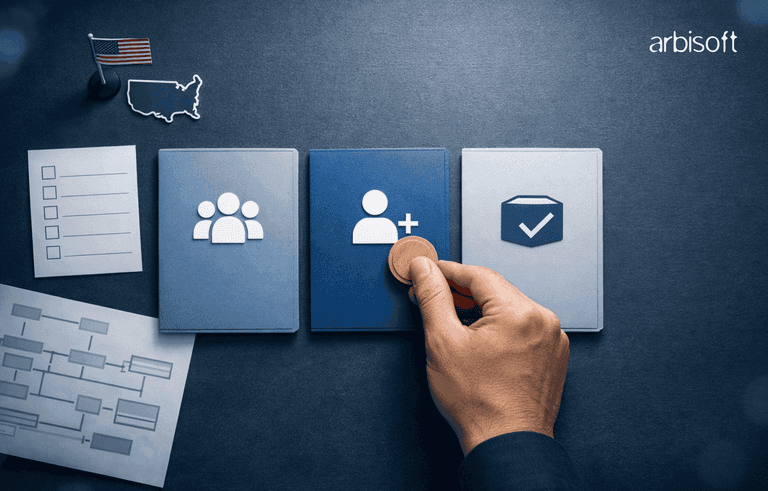We put excellence, value and quality above all - and it shows




A Technology Partnership That Goes Beyond Code

“Arbisoft has been my most trusted technology partner for now over 15 years. Arbisoft has very unique methods of recruiting and training, and the results demonstrate that. They have great teams, great positive attitudes and great communication.”
Adaptive Learning for Neurodivergent Students

Have you ever had a chance to think about a classroom where every student learns at a pace and in a way that truly suits them, where no one feels left out or held back by one-size-fits-all lessons? For neurodivergent students, those with unique cognitive profiles, such as ADHD, autism, or dyslexia, this vision isn’t just ideal, it’s life-changing. Adaptive learning powered by artificial intelligence AI can make it real, providing individualized experiences that facilitate understanding, boost engagement, and create a more inclusive educational experience.
In this blog, let’s explore how adaptive learning is changing the game for neurodiverse students by personalizing their educational journeys and unlocking the potential that often goes unrecognized.
Create a classroom where every student shines! Get your Neurodiversity-Friendly Classroom Checklist for easy, effective tips.

Make your classroom a place of belonging and growth.

So, What Is Neurodiversity?
Neurodiversity is the concept that there’s no single right way to learn or think. It acknowledges that every brain functions differently and that these differences should be respected and celebrated. In classrooms, neurodivergent students may process information in ways that standard approaches don’t fully support. For instance, some students with ADHD may excel with interactive and hands-on lessons, while others with autism may benefit from visual aids and structured routines. Recognizing and supporting these variations is foundational to inclusive education.
To support this diversity effectively, educators need tools that can adapt to these different learning profiles. This is where AI-based adaptive learning platforms come in, harnessing the power of ai and data science services to create personalized educational paths that meet students where they are and cater to their unique cognitive strengths.
Why Adaptive Learning Matters for Neurodivergent Students?
Statistics highlight the value of adaptive learning, showing performance improvements of up to 30% in students who learn in environments tailored to their needs. Adaptive learning shifts from the traditional one-size-fits-all approach and allows students to engage with material that matches their learning pace and style. By meeting neurodivergent students at their level, adaptive learning minimizes frustration and builds confidence, making learning a positive experience for every student.
AI-driven platforms like Smart Sparrow and DreamBox continuously assess a learner's strengths, adjusting the difficulty and presentation of content as they go. This ensures that students remain both challenged and supported, leading to deeper understanding and engagement over time.
Strategies for Personalizing Instruction to Diverse Learning Styles
Teaching neurodiverse students effectively means tailoring instruction to accommodate various cognitive styles. Some learners thrive with visual aids, others with auditory explanations, and still others through tactile activities. Research shows that adapting teaching methods based on these preferences improves engagement and knowledge retention.
AI-powered adaptive learning systems can help streamline this personalization. For example, platforms like CogniFit use assessments to pinpoint each student’s learning strengths and needs, providing teachers with data to guide tailored lesson planning. By analyzing real-time feedback, educators can offer customized resources and exercises that support each student’s unique learning style, fostering an environment where every learner can succeed.
Technology as a Bridge to Inclusion for Neurodiverse Learners
Today’s tech-driven classrooms, supported by innovative edtech services, offer unprecedented support for neurodiverse students. In fact, nearly 15-20% of students could benefit from specialized learning approaches, and technology can provide that bridge. By incorporating adaptive learning technologies, educators can help neurodivergent students access resources that align with their individual learning needs and allow them to process information at their own pace.
Platforms like Read&Write and ModMath are designed with neurodiverse students in mind. These tools use features like text-to-speech, voice recognition, and visual aids to support different cognitive needs, enabling students to interact with content in a way that feels natural to them. This approach improves learning outcomes and boosts confidence, showing students that their unique abilities are valued.
Schools that have adopted adaptive learning tools are already seeing positive impacts. One example, a study of elementary schools implementing AI-based platforms found that student’s test scores improved by nearly 30%, while dropout rates decreased significantly. These platforms analyze each student’s progress and adapt content delivery to match their pace and understanding, making learning more accessible and enjoyable for all.
A recent example from a K-12 school district showed remarkable results using the AI tool Lexia. This tool personalizes literacy instruction, helping teachers identify gaps and adapt lessons accordingly. Students engaged with Lexia saw substantial improvements in reading comprehension and confidence, highlighting the platform’s ability to make learning inclusive and effective.
Overcoming Barriers
Creating an inclusive classroom goes beyond adding new technology; it’s about building an environment where all students feel supported and understood. Various research shows that inclusive classrooms boost both academic performance and social skills for neurodivergent and neurotypical students alike. The key is to use flexible teaching strategies that recognize each learner’s unique needs and abilities.
Adaptive learning tools like Nearpod allow teachers to build lessons with various media, interactive elements, and response options, ensuring that every student can engage in a way that suits them. This flexibility is essential for neurodivergent students, allowing them to participate fully and confidently.
Ethical Considerations for Using Generative AI in Neurodivergent Education
With the increasing use of generative AI in education, it’s important to approach this technology with care, especially when it’s applied to support neurodivergent students, such as those with autism, ADHD, or dyslexia. While AI has the potential to create customized learning experiences, it needs to be used thoughtfully to avoid mistakes and make sure it genuinely helps students.
Why Ethical Oversight Matters
Generative AI can be a powerful tool to create learning materials that fit each student’s unique needs. Neurodivergent students, in particular, can benefit from AI that adapts lesson plans in real time. But without regular monitoring, AI may produce content that is inaccurate, biased, or doesn’t meet the needs of every learner. This requires schools to ensure AI tools are both safe and useful in classrooms.
A recent study from Nottingham Trent University 2024 looked at the effects of generative AI on neurodivergent students, including those with dyslexia. Here’s a quick look at the main findings:
1. AI can adapt content to meet each student’s unique way of learning, which helps neurodivergent students stay engaged and improve their learning experience.
2. Interactive and flexible AI tools can keep students more interested in their studies.
3. It’s important to keep an eye on AI-generated content to make sure it remains accurate, helpful, and fair. Consistent monitoring can help prevent issues that might interfere with learning.

Potential Risks and Ethical Challenges
Although AI offers many advantages, its use in education also raises some concerns. Research from Wharton highlights the ethical and practical risks of using AI in educational settings:
1. Without regular checks, AI could create content that is incorrect or biased, which might confuse students or even mislead them. Educators should make sure there are safeguards to review and filter AI-generated materials.
2. If AI isn’t carefully managed, it could unintentionally reinforce stereotypes or create content that is unsuitable for young learners. Setting strong ethical guidelines is essential to prevent this.
3. Relying too much on AI might discourage students from developing their own problem-solving and critical thinking skills. AI should be used as a tool to assist teaching, not to replace it.
Suggestions for Safe AI Use in Neurodivergent Education
Here are some tips for educators and developers who want to integrate AI safely into neurodivergent education:
1. Design courses that are specific to neurodivergent students, allowing them to adjust the content’s complexity and pace based on their own comfort.
2. AI-generated content should consider cultural backgrounds and language needs, especially in diverse regions. Offering materials in regional languages and in ways that are culturally relatable makes learning more inclusive.
3. Using AI to adapt lessons to a student’s learning style and pace can help neurodivergent students engage with the material in a way that suits them best.
In A Nutshell
As we integrate generative AI in education, especially for neurodivergent students, a balanced approach that respects each student's unique needs is essential. By ensuring ethical standards, maintaining transparency, and upholding high-quality content, AI can help create an inclusive, engaging environment where neurodivergent learners thrive.
Embracing adaptive, AI-powered strategies allows educators to foster a space where students with diverse learning styles feel valued and supported. This approach not only enhances academic performance but also promotes a culture of acceptance and respect, preparing every student to succeed in an increasingly dynamic, diverse environment.
























